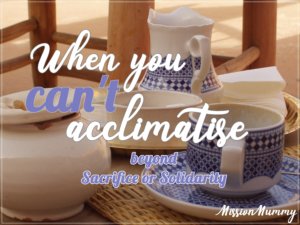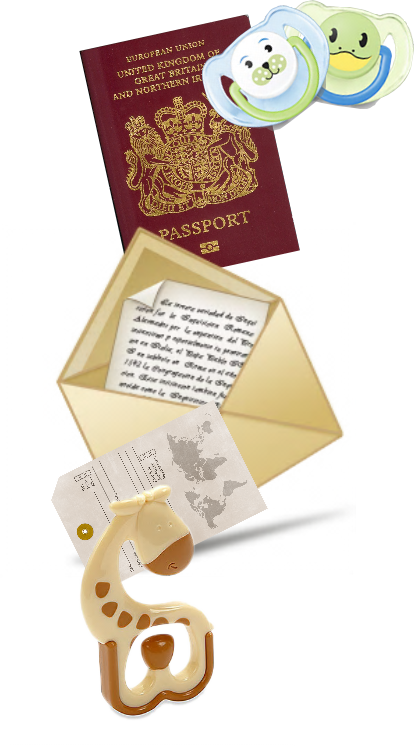When you can’t Acclimatise : beyond Sacrifice or SolidarityOctober 16, 2018

I was still green, the early days of marriage and the struggle of the unfamiliar dynamics of life as a foreigner shadowed my movements. I was meeting a foreign friend and another foreign lady for tea in a city where coffee was the beverage of choice. I remember it was one of those times a circle closes, you hear about someone from various sides and finally you get to see their face and sit and chat and confirm or dispel the bridges your mind has made between information snippets.
From what I’d heard I was sitting with a lady who could not truly feel comfortable with the language even after years of study and multiple learning approaches, still she and her husband were called to name this city their home, and that tension isolated her. She turned to me during conversation in a moment of mutual recognition for our situations and asked, in so many words,- “what should we do?” Her eyes looked deep at me, awaiting my opinion on squaring the circle and I opened my mouth far too swiftly. I regret the words that slipped from my mouth and yet they came tumbling out. “We should stick together” I replied.
Walking home my mistake sat heavy. I knew right away that joining someone in a prison cell doesn’t make them more free. I thought back to days where I’d walk down certain city streets in the UK and my white British-ness would stand out sorely. I remember hearing the people as I passed the shops full of unfamiliar items and smells, their words a torrent of unfamiliar syllables. I’ll readily admit my discomfort, but amid that was a sadness for this community that in order to acclimatise has isolated themselves in a larger cage. They had squared the circle but at what cost? I knew that simply sticking together wasn’t the answer.
Equally, as both this lady and I can attest, sometimes people can’t fully acclimatise. It’s 8+ years and my language still falters at basic conversation. For those that do “acclimatise” the situation can be as hard a prospect to envision from an outsiders perspective. Today I met another lady who now called this country home. The topic of Christmas came up and she dismissed it, she had abandoned the typical western dates, taking only the Serbian celebration. Again and again when the conversation turned to a point of cultural tension she dismissed it. She had learnt the language, had thrown her life and family into the culture head first, her approach almost a cliche of ‘when in Rome’. My heart broke, for this approach seemed to hold so little value in heritage, that it could be discarded and replaced like an ill suited garment.
What I didn’t know how to articulate way back then was that the way forward would be to empower ‘cultural brokers’ between us. Both hiding in our micro communities or walking into the culture at any cost both come from a place of independence. Both answer the question of ‘how I can fit‘ in a place where I didn’t first belong? Cultural brokers however lead us to a place of interdependence where we can fully be community, instead asking ‘how can I join you?‘
A cultural broker is a person who provides a bridge joining the gap between two parties from different cultures, and more importantly helps both parties to find ways of crossing the bridge.
Cultural brokers are not necessarily well travelled or well versed but most people who find themselves settling somewhere foreign, to them, can easily pick them out. I’ve spent my life moving churches and the cultural brokers who welcomed us are people I’ll never forget. The problem is we don’t see them as such. We see them as friends who understand and we are selfish with their attentions, more so when the feelings of isolation creep in. Moving communities this isn’t so acute, but moving major cultures with all the joys of language heightens that dependence we have on these souls.
One day I’d like to meet that lady again, or perhaps someone in the same position. I’d like to share a much better cup of tea and talk to her about my community. I’d like to offer to introduce her to the people who stand in that gap which language and norms and expectations create. I’d like to share how we met, how the people we expect to fill this role may let us down and the unlikely hero may surface after time. I’d like to offer the branch of friendship into a bid to find a place where that tension is a beautiful thing and not a thing of pain.


Sounds to me like you’ve come a very long way in your development and maturity in those 8+years. The physical language can’t be everything or you must have more understanding of it than you give yourself credit for.
Maybe you’ve used your cultural broker’s well and some day you’ll be called to be that for some one else.
yes, I’d love to be that broker to another, though I don’t fool myself that I no longer have a dire need of such people for myself!
I found this profoundly moving and thought provoking. Thank you for sharing. I have a friend who married a German in her twenties and has lived in Germany the rest of her life…now 78 years old. We visit one another annually, turn and turn about. She and her husband were both students of English and German which was a great help. She is of course desperately sad about Brexit. I believe we are making a massive mistake there.
Being a student of language, or simply possessing the ability to pick it up makes a huge difference. While language is the most obvious indicator I think it goes much deeper than our ability to, or not to, communicate freely. Having regular chances to travel or have friends travel to see us makes a big difference to us finding a balance within our two cultures.